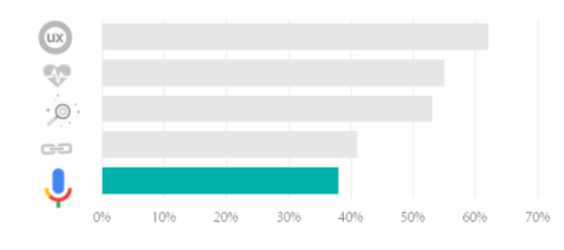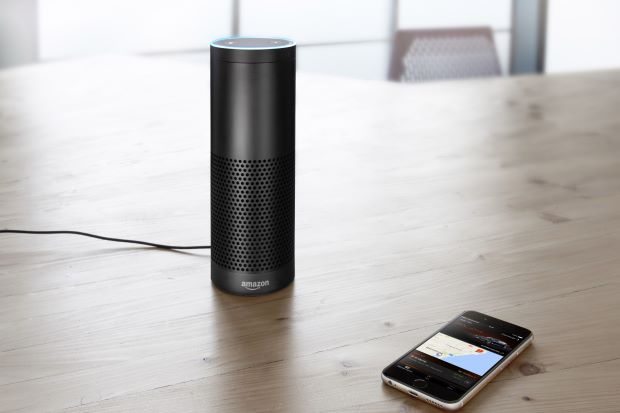- Jeff Bezos: “Alexa, buy me something from Whole Foods.”
- Alexa: “Buying Whole Foods.”
- Jeff Bezos: “Wait, what?”
This tweet quickly spread around the internet and perfectly illustrates the topic of this article.
“Conversation as a Platform” and “Conversation as a Service” are both terms that mark the advent of a new interface which may soon supersede good old touch screens.
Currently, using your voice to interact with a service is still somewhat limited to personal assistance, adjusting lights or playing music. But in the future, this interface should take on a whole new dimension and become part of the vast majority of our interactions with smartphones, as well as with other devices and services. And I can prove it, look at the evolution of one of the most famous vocal queries in France (“Call Mom”) on Google Trends since 2004.

Not convinced? Look around you: smart speakers are already invading our homes – under the names of Echo, HomePod or simply Home – and they come with their own virtual assistants: Siri, Alexa, Cortana or simply Google Assistant. One thing is certain, they will change the way we look for information.
As a matter of fact, a survey conducted by SEO Camp shows that Voice Search is one of the top preoccupations in 2017. Clearly, UX, Web Performances, Semantic Analysis and Net Linking remain at the top. But the fact that Voice Search ranks 5th clearly shows how crucial it will become in the upcoming years.

Is this development an opportunity or a threat?
An additional channel is, in my opinion, a great opportunity – but you may still need to be won over, as it’s true that these new developments raise a number of questions. For instance, let’s say you’re searching for a restaurant in Bristol on Tuesday evening. You take out your smartphone and type into Google: “Restaurant Bristol Tuesday evening”.
Now, imagine that, instead of typing your request into Google, you simply ask a virtual assistant. This would sound something like: “Cortana, could you find me a restaurant in Bristol that’s open on Tuesday?” Sounds normal, right? A human can type between 30 and 40 words per minute, but can speak three times faster (100 to 150 words per minute). And as you can see in this example, the second request is directly linked to an action. In the world of Voice Searches, this type of request happens 30 times more often.
This is another point to consider – because regardless of your chosen assistant, and even if these two searches are made via Google, the results are significantly different. The reason is simple: the search terms are not strictly the same. Not to mention what some already call the ‘Erudition Phenomenon’: voice queries will be richer, at a lexical level, than their keyboard counterparts.

Opportunity #1: a tailored SEO strategy!
A strategy that focuses on Long Tail SEO will have more impact when it comes to voice searches, for as shown in the example above, your audience will gradually adapt their way of searching for information. Queries will become longer, simply due to the fact that users will begin to humanize their interaction with the different services.
This means that you could potentially position yourself under new keywords. Not that users will suddenly start using new words, but think about it. Take, for example, certain brand names that are difficult to pronounce. Imagine a dealer for a Korean car make or the distributor of a well-known Chinese phone brand. Don’t you think it would be wise for these brands to create an FAQ section or a blog post on the incorrect pronunciations or variations of their names? I do.
And let’s not forget the famous Featured Snippets, which, from a voice search point of view, will allow you to better address the target audience’s questions by highlighting organic qualitative content: a must for the user experience. It’s true that creating a search with this new interface should generate a unique response, so that the user does not need to carry out an additional interaction. Google then prioritizes this type of response in voice searches – even reading out the response in certain cases.
Opportunity #2: a great way of showcasing your products or services
In terms of SEO, this seems relatively clear-cut – but how can you make use of these new methods of communication to increase awareness of your products or services? Is that really possible?
Of course it is! Google has just brought a great new feature to the table: Actions on Google.
The “actions” are in fact apps that you can develop using templates, of which there are three so far:
- Trivia: recreate your own version of Trivial Pursuits, or transform your Echo Dot into a portable game show host, in just a few clicks.
- Personality quiz: a “safe” way of sorting your friends into different groups or helping them find out what city they should live in…
- Flash Cards: short interactive content which allows you to quickly learn information on a given subject.
How are these three apps an original form of response? Well, simply because in the world of voice technology, the objective will no longer be to be seen, but to be heard. Your services could be the main subject of a Trivia app, or your products could be illustrated in flash card form.
Willing to know more about Google Actions? Then click here !
When should I start getting involved?
Let’s be honest: for the time being, the return on investment for these strategies is pretty low. There are some exceptions, but at the moment, don’t expect significant and immediate gains with these new channels.
Actions on Google, for example, is clearly not yet being widely used. Some other APIs let you develop transactional apps (to process online product orders), but these require interactions on the device’s screen, so they are not yet “full voice”. However, it’s an approach which I urge you to consider if you’re adventurous and want to be among the pioneers. Its implementation is quite simple and, technically–speaking, it is not very complicated.
Where voice searches are concerned, it’s only a matter of time. Because while Cortana doesn’t yet cover all geographical locations and Alexa doesn’t yet speak some major languages, the number of “OK Google” searches will only increase. Currently, 20% of searches are made vocally, and while the pundits seem to still be in disagreement about how and when the shift will begin (Gartner thinks that by 2020, only 30% of searches will be done using a screen, while Comscore estimates that in three years’ time, 50% of searches will be done using a voice interface), it’s clear that the sooner you start, the easier you’ll be able to make yourself heard!
So bear it in mind…
Eager to boost your organic referencing ? Visit the SEO section of our website and discover how our experts can help.
Willing to share your point of view? Any remark, question or suggestion? Please do not hesitate to comment!


